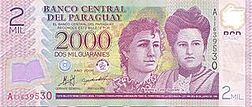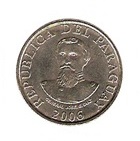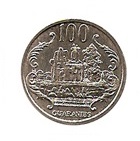Paraguayan guaraní facts for kids
Quick facts for kids Paraguayan guaraní |
|||
|---|---|---|---|
|
|||
| ISO 4217 Code | PYG | ||
| User(s) | |||
| Inflation | 2% | ||
| Subunit | |||
| 1⁄100 | céntimo (¢) because of inflation, céntimos are no longer in use. |
||
| Symbol | ₲ or Gs. | ||
| Plural | guaraníes | ||
| Coins | ₲50, ₲100, ₲500, ₲1,000 | ||
| Banknotes | ₲2,000, ₲5,000, ₲10,000, ₲20,000, ₲50,000, ₲100,000 | ||
| Printer | De La Rue Giesecke & Devrient Polish Security Printing Works |
||
The guaraní (pronounced gwa-ra-NEE) is the official money of Paraguay. Its symbol is ₲ or "Gs.". The guaraní was once divided into 100 smaller parts called céntimos. However, because prices have gone up over time (this is called inflation), céntimo coins are not used anymore.
Contents
History of the Guaraní
The guaraní was created by a special law on October 5, 1943. It took the place of the old money, the "peso fuerte." One guaraní was worth 100 pesos fuertes. The first guaraní coins and banknotes were used in 1944.
Between 1960 and 1985, the guaraní had a fixed value compared to the United States dollar. This meant that 126 guaraníes were always worth 1 US dollar.
Plans for a New Guaraní
Today, the guaraní is one of the currencies with the lowest value in the Americas. For example, in June 2024, 1 US dollar was worth about ₲7,520.
In 2011, there were plans to change the guaraní. The idea was to create a "Nuevo guaraní" (New guaraní), where 1 New guaraní would be worth 1,000 old guaraníes. This would have made the numbers on the money smaller.
There would have been a two-year period where both old and new money were used. After that, new banknotes with the lower values would have been introduced, and they would have gone back to being called just "guaraní." However, these plans were put on hold because people were worried it might cause confusion.
Guaraní Coins
In 1944, the first guaraní coins were made from a mix of aluminum and bronze. They came in values of 1¢, 5¢, 10¢, 25¢, and 50¢. All these coins were round.
- The 1¢, 5¢, 10¢, and 25¢ coins showed a flower on one side.
- The 50¢ coin had a lion and a special hat called a Liberty cap.
Here are some of the first céntimo coins:
| Value | Obverse (Front) | Reverse (Back) | First issued |
|---|---|---|---|
| 1¢ | Flower of the common guava plant | Value and a wreath (a circle of leaves) | 1944 |
| 5¢ | Flower of the Passiflora edullis plant | Value and a wreath | 1944 |
| 25¢ | An orange blossom, the flower of the orange tree | Value and a wreath | 1944 |
| 50¢ | Flower of the Lapacho tree, the national tree of Paraguay | Value and a wreath | 1944 |
A second set of céntimo coins came out in 1953. These were 10¢, 15¢, 25¢, and 50¢. They were also made of aluminum-bronze but had a wavy, scallop shape. These céntimo coins stopped being valid money in 1966.
In 1975, new coins were introduced for ₲1, ₲5, ₲10, and ₲50. These were round and made of stainless steel. Later, in 1990, ₲100 coins were added, followed by ₲500 coins in 1997. The ₲1,000 coins were made in 2006 and released in 2007.
Some older coins, like the ₲1, ₲5, ₲10, ₲50, ₲100, and ₲500 coins made before 2005, are no longer valid money since January 8, 2014.
Here are some of the current guaraní coins:
| Value | Obverse (Front) | Reverse (Back) | First issued | Obverse Image | Reverse Image |
|---|---|---|---|---|---|
| ₲50 | Marshal José Félix Estigarribia | Acaray Dam | 1975 | ||
| ₲100 | General José Eduvigis Díaz | Ruins of Humaitá | 1990 | ||
| ₲500 | General Bernardino Caballero | Central Bank of Paraguay | 1997 | ||
| ₲1,000 | Marshal Francisco Solano López | National Pantheon of the Heroes | 2006 |
Guaraní Banknotes
The very first guaraní banknotes were actually old peso fuerte notes that had new guaraní values stamped on them. Soon after, new guaraní notes were printed for ₲1, ₲5, ₲10, ₲50, ₲100, ₲500, and ₲1,000. These were printed by a company called De La Rue.
In 1963, the banknotes were completely redesigned. New, higher values like ₲5,000 and ₲10,000 were also added. In 1982, the notes started to include the names of the values in the Guaraní language on the back.
The first ₲50,000 notes were issued in 1990, and ₲100,000 notes followed in 1998.
Since 2004, most banknotes have had small but noticeable changes. They now have better designs and improved security features to prevent fake money. The ₲20,000 note is printed by Giesecke & Devrient, while De La Rue prints the others. In 2009, the Central Bank released the first ₲2,000 notes made from a special plastic material called polymer. This makes them last longer than regular paper notes.
Some ₲50,000 notes from a specific series (Series C, dated 2005) were not officially released by the central bank. These notes were later declared invalid and worthless. Also, ₲1,000 notes and older ₲50,000 notes (Series A and B) were taken out of circulation in 2012.
A new ₲5,000 note was released on January 14, 2013. This note was printed by The Canadian Bank Note Company. It has special security features, like a clear window shaped like a train and a watermark of the portrait. It still features Don Carlos Antonio Lopez on the front and his palace on the back.
The ₲10,000 and ₲20,000 notes are printed by the Polish Security Printing Works.
On December 22, 2016, new versions of the ₲20,000, ₲50,000, and ₲100,000 notes were introduced with even more improved security features.
Here are the different guaraní banknotes:
| Value | Color | Obverse (Front) | Reverse (Back) | First issued | Obverse Image | Reverse Image |
|---|---|---|---|---|---|---|
| ₲2,000 | Magenta | Adela and Celsa Speratti (important educators) | School parade | 2008 |  |
 |
| ₲5,000 | Orange | Carlos Antonio López (former President) | Palace of the Lopez | 1963 | ||
| ₲10,000 | Brown | José Gaspar Rodríguez de Francia (first leader of Paraguay) | Scene from May 15, 1811 (Independence Day) | 1963 | ||
| ₲20,000 | Light blue | Paraguayan woman | Central Bank of Paraguay building | 2005 | ||
| ₲50,000 | Beige | Agustín Pío Barrios (famous guitarist) | Guitar of Agustín Pío Barrios | 1990 | ||
| ₲100,000 | Green | Saint Roque González de Santa Cruz (missionary) | Itaipú Dam (a large hydroelectric dam) | 1998 |
Exchange Rates
| Current PYG exchange rates | |
|---|---|
| From Google Finance: | AUD CAD CHF EUR GBP HKD JPY USD ARS BRL |
| From Yahoo! Finance: | AUD CAD CHF EUR GBP HKD JPY USD ARS BRL |
| From XE.com: | AUD CAD CHF EUR GBP HKD JPY USD ARS BRL |
| From OANDA: | AUD CAD CHF EUR GBP HKD JPY USD ARS BRL |
| From fxtop.com: | AUD CAD CHF EUR GBP HKD JPY USD ARS BRL |
See Also
- Economy of Paraguay
 | Sharif Bey |
 | Hale Woodruff |
 | Richmond Barthé |
 | Purvis Young |




